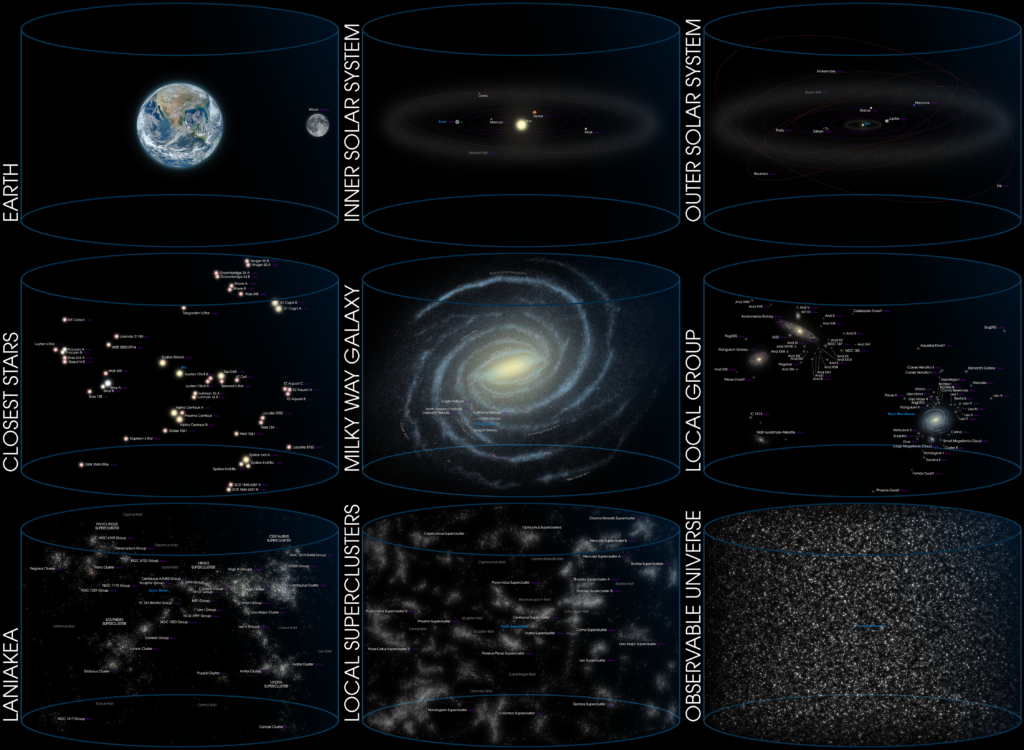This article is the follow up to « The Case for Space » published on 20/07/2021.
Whenever someone talks about aliens, it conjures images of little green men disembarking their spacecraft, poised to invade planet Earth. Despite humanity’s best attempts, they are outmatched by the aliens’ superior technology. There you go – the plot of every sci-fi film ever. Indeed, its association with the genre may be the reason why some scientists consider the search for Extra-Terrestrial Intelligence (ETI) eccentric or even useless and wish to divert research money elsewhere [1]. Yet nothing in the laws of physics rules it out. So why haven’t we found it? The problem lies in the vastness of the universe and our limited knowledge about where to look and what exactly for. Let’s explore these challenges in more detail.
Firstly, the incomprehensible size of the cosmos. So big, in fact, that not even our most powerful telescopes can see its limits (assuming they exist). The part that we can see, known as the observable universe, is 46 billion light-years across and contains 7 trillion galaxies, each one with an estimated 100 million stars, most of which harbour planets [2][3]. Indeed, by some estimates, there are more planets in the universe than grains of sand on every beach in the world [4]. With numbers like these, some people have argued that the existence of ETI is virtually certain: even if it arises ex nihilo on only a miniscule percentage of planets, there would nevertheless be billions of opportunities for it to evolve to intelligence, at least a handful of which are likely to come to fruition [5]. This logic, known as the abundancy hypothesis, is probably the strongest argument for the existence ETI [6].

Yet, it is still open to reproach. One of the most effective counterarguments is that it unreasonably assumes the principle of mediocrity (POM), which states that if an item is drawn at random from a set of categories, it’s likelier to come from the most numerous category than from any of the less numerous ones. This line of thinking is implicit in the abundancy hypothesis, which assumes that because we are able to observe ourselves, there are likely to be other intelligent beings who can do the same [7]. For POM’s detractors, this is a step too far. They argue that being able to observe ourselves is a byproduct of our own existence, an effect that would be present whether or not ETI exists. Indeed, while POM may work well when considering external phenomena, applying it to ourselves may result in a biased logic since we are both at once the observer and the subject of observation – it is just too tempting to believe that there are other beings out there who experience the same as we do [8].
Despite this potential pitfall, POM underpins the contemporary search for ETI. Not just in the simple assumption that it is out there and abundant, but in the more pervasive sense that it is probably like us or has an origin and evolutionary trajectory similar to terrestrial life. Indeed, it is often hypothesised that if ETI has arisen, it will have been on a small rocky planet with a thick atmosphere and plentiful liquid water. Because of this, the search for aliens has often focused resources on finding “super earths” lying in the “goldilocks zone” (far enough from their star that water remains in liquid form) [9]. The problem with this line of thinking is that should POM prove inapplicable to ETI, then we may have been looking for aliens in the wrong place. That is to say, if ETI dwells on gas giants or in interstellar space, with our efforts focussed elsewhere, there is a risk that we could miss it [10].
Another working assumption behind the search for alien civilisations is that we may receive a radio message from them. That is why millions of hours have been spent scanning the heavens for artificial signals from deep space. This presumes that ETI would be close enough for a radio signal to be able to reach us and that if it did, we would recognise it for what it is. Yet neither of these assumptions is a slam-dunk. Firstly, radio signals slowly degrade as they cross the cosmos; secondly, they cannot travel faster than the speed of light. This would make contact with alien civilisations from outside the galaxy very difficult indeed. If they tried to send us a message, it may arrive garbled or indistinguishable from background radiation [11]. Worse still, it could take millions of years to reach Earth, by which time humanity could be extinct, having succumbed to any number of existential risks including nuclear catastrophe, climate change, and/or asteroid impact [12].
In fact, the prospect of making contact with ETI is diminishing rapidly due to one of the universe’s worst kept secrets – that it is expanding. New space is being created at an unimaginably quick pace, effectively meaning that galaxies are moving away from each other faster than the speed of light [13]. Radio signals (or spaceships for that matter) can never hope to travel more rapidly than the expansion rate because special relativity means that they cannot attain faster-than-light speeds (thank-you Einstein). This means that hundreds of galaxies are sailing beyond contactable distance every second you’re alive. In fact, 94% of the observable universe has already passed this event horizon, meaning that it will remain inaccessible forever (see video for a complete explanation) [14]. Depressing, I know. And that is the key problem in the search for ETI. It is like looking for a needle in an incessantly expanding haystack, except that you don’t know what the needle looks like, and it might disappear forever, without warning.
There are however some positives. The flipside of the expanding universe is the effect of gravity, which draws together proximate heavenly structures. So, although most of the universe will eventually disappear from view, our neighbouring galaxies will actually get closer [15]. This means that it should always be possible to look for alien civilisations in our cosmic backyard; a place where, in theory, they should be easy to contact. However, the fact remains that we have not found evidence of ETI in the Milky Way. This is despite the galaxy’s age – it has been around for 13.6 billion years, leaving plenty of time for a civilisation more advanced than ours to have explored its furthest reaches. Indeed, with the help of self-replicating probes, such a feat could be accomplished within a mere million years, with the signs of it likely ubiquitous [16]. The lack of evidence for ETI in the Milky Way has led some to conclude that we are the only intelligent life in the galaxy. This theory, taken together with the difficulties of establishing contact with ETI over intergalactic distances, may provide a somewhat convincing explanation for the “The Great Silence” (aka the Fermi Paradox): on the one hand we are alone in the Milky Way and on the other we may find it impossible to communicate with life in other galaxies [17].
In this sense, the size of the universe is both a blessing and a curse. Whilst it may increase the chances of ETI existing, it acts to decrease the prospect of making contact with it. Yet, that doesn’t mean we shouldn’t try. The potential ramifications of communication with aliens are vast – merely confirming their presence would resolve the deep philosophical question about whether we are alone in the universe. Yes, there are those who warn that first contact could be a dangerous leap into the unknown or result in a War of the Worlds style calamity [18]. Such concerns though, are likely overblown – an ETI that’s been around longer than us would surely know a thing or two about peace – their very existence would imply that they have overcome challenges associated to mutually assured destruction [19]. Such lessons could be useful to us too (especially in the current context), with legendary astronomers Carl Sagan and Frank Drake arguing that exchange with aliens would “inevitably enrich mankind beyond imagination » [20]. Not only could they teach us how to reform our own morality, but they may have revolutionary new insights into physics, chemistry, and mathematics [21]. Why give up on this opportunity just because a subset of the scientific community cannot take ETI seriously?





Laisser un commentaire
Vous devez vous connecter pour publier un commentaire.